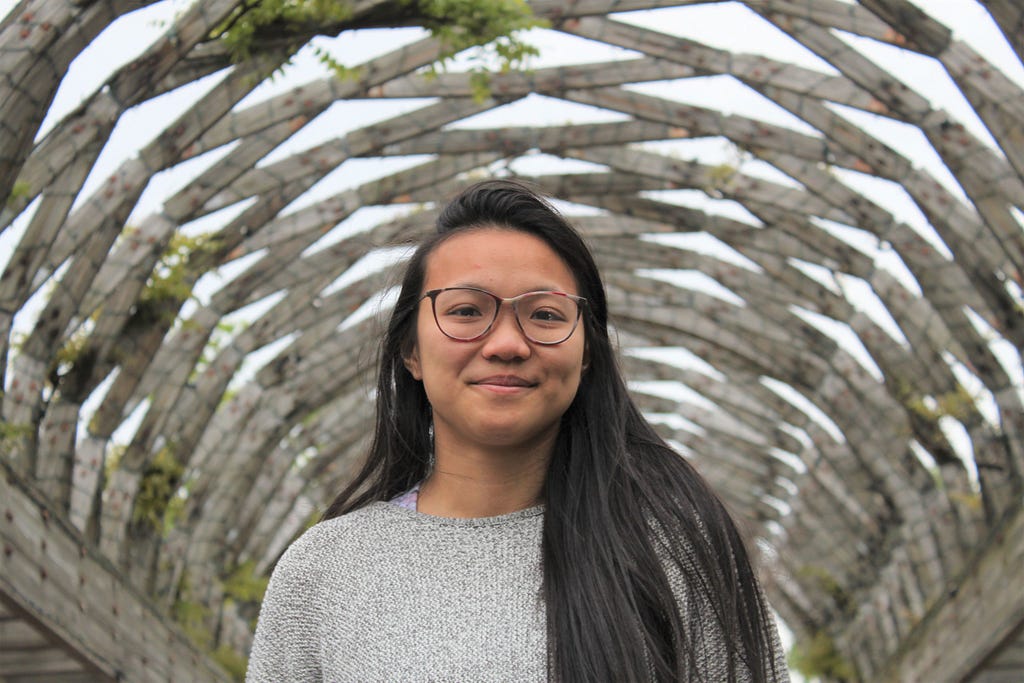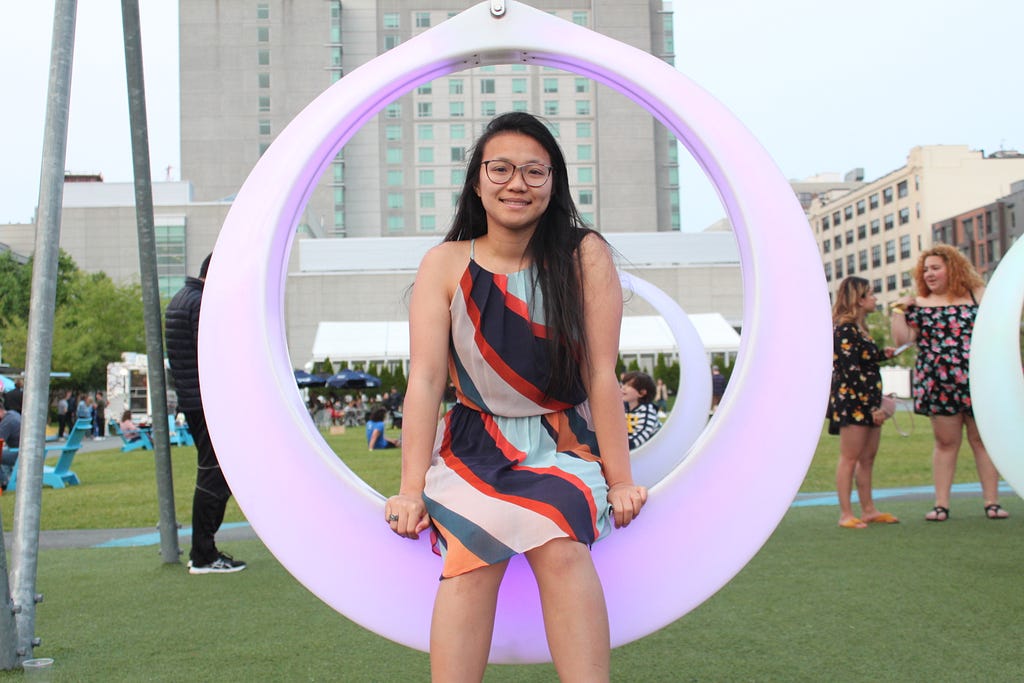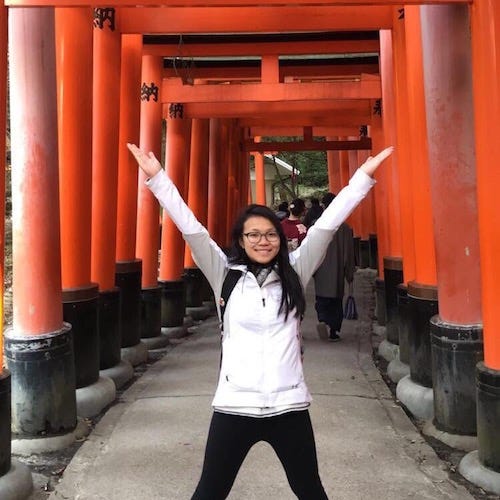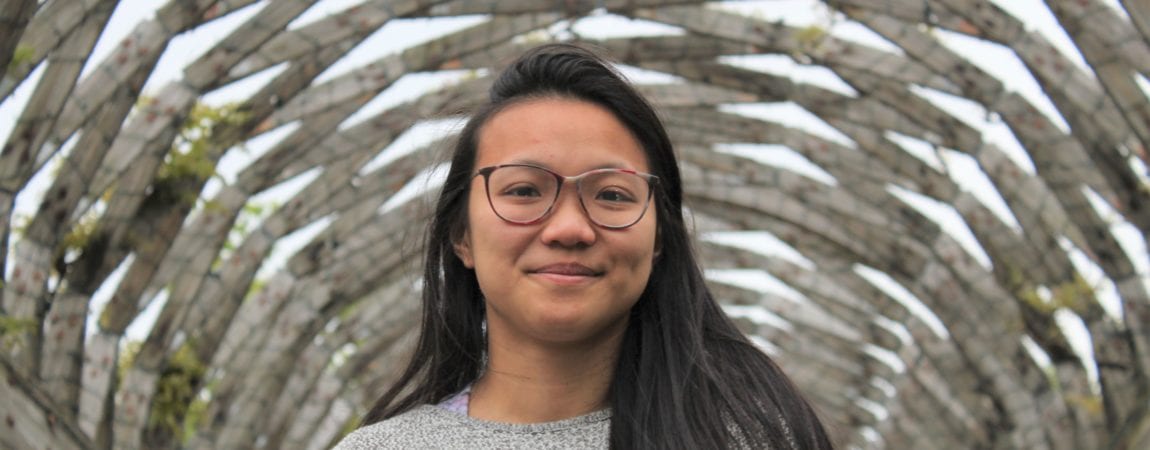On origami, the power of storytelling, and product design.
Tiffany is an MEng student studying mechanical engineering with a concentration in product design, and also the Communications Representative for the MEng class of 2020. She is originally from a small town in Indiana near Chicago, and is looking forward to learning more about entrepreneurship and making meaningful relationships during her time at Berkeley. Her current interests are VR/AR technologies and Human-Computer Interaction design. We had the chance to ask Tiffany some questions about her journey to MEng and her goals for the future.
What inspired you to pursue engineering?
“Honestly, when I was younger I wasn’t too sure what I wanted to do. I was pretty crafty as a kid and loved to make cardboard and paper models. For as long as I can remember, I’ve always liked making and crafting with my hands. I remember [making] scale models of our house out of cardboard and paper, along with small figurines of me and my family For a while, I thought I wanted to be a doctor, but then, I realized I didn’t really like [and wasn’t] interested in biology. My family immigrated from Vietnam to America after the Vietnam War, so they never got to pursue higher education. My dad always wanted to be a mechanic or electrical engineer but didn’t get the opportunity to, so I think that had some small influence.What are you currently studying?
I received my B.S. in mechanical engineering from MIT (Massachusetts Institute of Technology) with a minor in design. Here at UC Berkeley, I am pursuing a Master of Engineering degree in mechanical engineering with a concentration in product design. As I mentioned before, I love making things and building tools that people can use. I specialize and focus on human-centered design and interaction design since I think it is really interesting to analyze human behavior and see common trends across a spectrum of people. As I grow, I aim to make design and engineering a more cohesive strategy to approach. I love design because it allows me to see and come across interesting problems and how to best approach [those problems]. I love engineering because it is the toolbox that allows me to make these visions and solutions technically feasible.“I love engineering because it is the toolbox that allows me to make these visions and solutions technically feasible.”

What led you to the MEng program?
After my undergrad, I felt a little lost. I felt like I had a lot of breadth but not depth. My skills in mechanical engineering are very broad: prototyping, CAD (Computer-aided design), materials and mechanics, dynamics, controls, thermodynamics, etc. However, I wanted the opportunity to focus more on determining what type of career path to pursue, and what steps I can take to make sure I am on the right path. I am using the MEng opportunity to help narrow my focus on my field (since mechanical engineering is so broad), and explore new innovations in my field. I am particularly interested in VR/AR technologies and how they will be integrated into society, and I am looking forward to how human-centered design is going to be affected by VR/AR.What are your hobbies, and do any influence/correlate with your engineering work?
I LOVE origami. During my time at MIT, I was part of the origaMIT club and would help teach kids and other students how to fold origami. What I like in particular about origami is the constraint of having one piece of paper and transforming it into something else. A lot of my projects are origami-inspired, since I like to look at making my solutions compact and versatile. I also enjoy photography and videography and try to think of interesting ways I can capture engineering and relate it to other people. I also like to travel and even spent a semester abroad in Japan to practice my Japanese and learn in a different culture. It was really interesting, and I was first inspired to go because I liked doing origami.
What is your favorite project or research topic that you have worked on?
As someone who is very attuned to my emotions and has a very empathetic personality, it didn’t take me long to realize that my niche was in wanting to make an impact on people’s lives. One of my more extensive projects was my work on a breastfeeding aid device for mothers with children with cleft lip and cleft palate. I interviewed 20+ mothers, and while these families were not personally connected, I stumbled upon a common thread — a community — struggling with the same challenges. Not only did I deliver a product that improved their lives, but through storytelling, I was able to convey their stories and dispel the perceptions and myths formed in the outside community that clouded the truth and negatively affected those mothers. [This project] really motivated me to listen to other people and helped me use strategies to better relate to other people.What is your Capstone project?
My Capstone project is with Coleman Fung and a partnership with Blue Goji. Blue Goji is a technology company focused on improving the overall health of people from all walks of life. Their mission is to combine exercise and entertainment for the benefit of people everywhere. The particular project I’m working on is making a stationary bike more interactive by integrating VR capabilities and haptic sensors/technology to make the indoor exercise experience more immersive.What kind of impact do you want to have on the world?
Impact is a big word. I always have to think twice about what it means to me; the first thing [that comes to mind] is always how my background impacted me. As a first-generation student, it was very difficult for me to navigate the education system and figure out how and where would I access the necessary financial tools and learn about the resources that would help me succeed in life. I remember in high school, I wanted to make something of myself, because I didn’t like the fear of failing and especially failing because of having a lack of knowledge of what opportunities there were. For this reason, I am especially curious about how I can make an impact in the education system to help give communities with fewer resources the same education opportunities in other areas. In high school, I organized “STEM Days” with our neighboring middle schools and hosted fun science fair experiments at their respective locations in order to help increase their engagement and curiosity about STEM topics.“A strong philosophy of mine is that the design and engineering of products should [make sure] those products intuitively overlap into our lives.”Currently, I’m also thinking about electronic products on a consumer level, since I think it’s interesting how one device or product can make a huge impact on such a large population of people (e.g. computers, phones). I am also interested in how to seamlessly integrate technology into our lives. A strong philosophy of mine is that the design and engineering of products should [make sure] those products intuitively overlap into our lives. One of the products I love is the Nintendo Switch gaming console. It acts as a portable device and in-home entertainment system, and what I love most about it is how easy and intuitive it is to use for people of all ages, genders, and etc.” Connect with Tiffany. Fung Features is a series dedicated to showcasing the Fung community from various cohorts and backgrounds and learning more about their lives and their stories. If you’re interested in being featured, email funginstitute@berkeley.edu.
Fung Feature: Tiffany Tao, MEng ’20 (ME) was originally published in Berkeley Master of Engineering on Medium, where people are continuing the conversation by highlighting and responding to this story.





